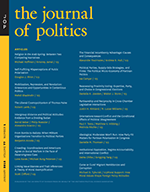Terrorism, Spoiling, and the Resolution of Civil Wars
|
Article: View here
|
Citation:
Findley, Michael G., and Joseph K. Young. 2015. "Terrorism, Spoiling, and the Resolution of Civil Wars." Journal of Politics. 77(4): 1115-1128. Abstract: Civil war combatants use terrorism frequently during civil wars, yet we understand very little about terrorism's effects on war resolution. It is generally assumed that the primary combatants to a war hold a veto over the resolution of the war, but less attention has been devoted to whether the use of terrorism during civil wars can derail peace agreements. We contend that even terrorism, a generally low intensity form of violence, can make civil war peace processes less likely to conclude in a peaceful, durable resolution. Using a new and large geographically coded database of terrorism in civil wars, we find that the use of terror tactics can spoil peace processes by prolonging the time until the end of a war, or hastening the time until recurrence. Our argument and results add to the literature on civil wars by explicating the process linking terrorism to war duration and outcome. We also provide empirical tests, which have been lacking in past studies of spoiling and civil war resolution. More generally, the results underscore the importance of investigating different varieties of political violence during civil conflict.
|
